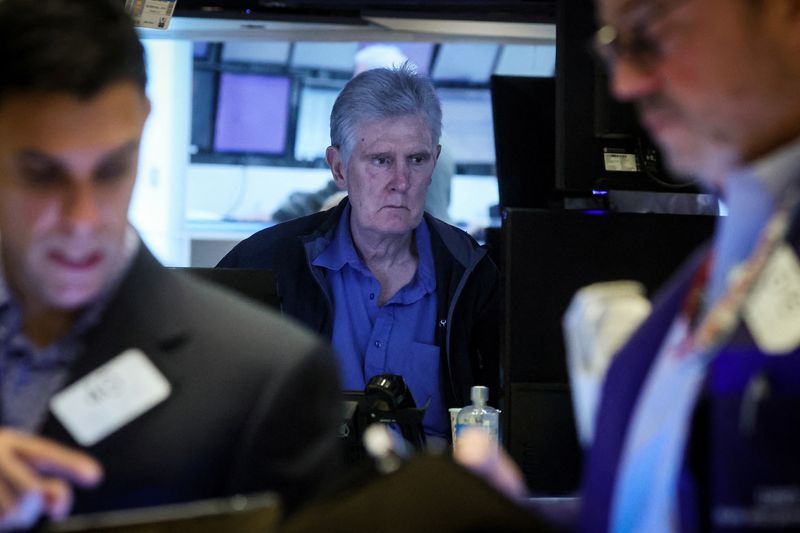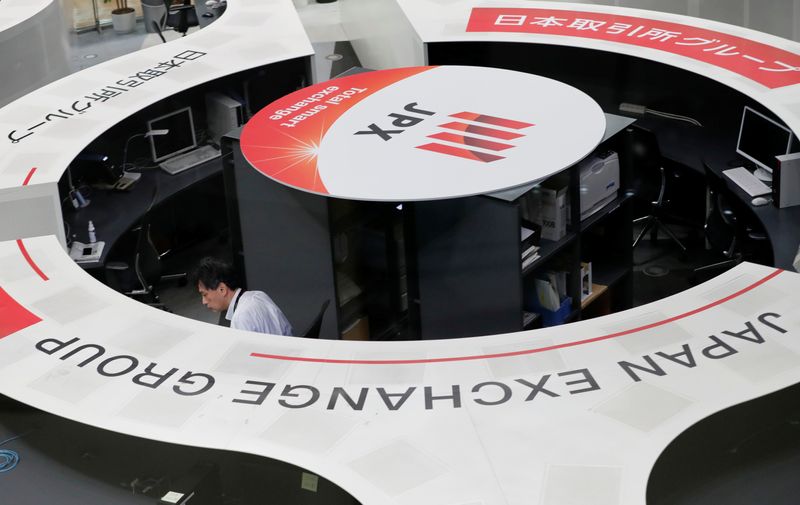By Chris Prentice and Amanda Cooper
NEW YORK/LONDON (Reuters) -Global shares stemmed a five-session rout on Tuesday as bank shares rebounded and closely-watched U.S. inflation data was in line with expectations, bolstering bets of a smaller interest rate hike by the Federal Reserve at its meeting next week.
Bond yields in the U.S. and the euro zone rose after plunging the previous day, curbing a crisis-driven rally in gold.
Crude oil futures dropped over 4% to a three-month low.
Data showed the U.S. Consumer Price Index (CPI) rose 0.4% in February versus 0.5% a month earlier. On a yearly basis, it rose 6.0% in February, compared with 6.4% in January.
U.S. Treasury yields moderately extended gains following the data, indicating some expectation that the Fed could continue to raise rates but at a gradual pace. [US/]
"The CPI report although in line and not perfect did not scream that they have no choice but to raise. The Fed still has options, which is a good thing," said Jamie Cox, managing partner for Harris Financial Group in Richmond, Virginia.
Tuesday's broad gains in equity markets signaled a "relief rally," he said.
The Dow Jones Industrial Average rose 336.26 points, or 1.06%, to 32,155.4, the S&P 500 gained 64.8 points, or 1.68%, to 3,920.56 and the Nasdaq Composite added 239.31 points, or 2.14%, to 11,428.15.
All 11 major sectors in the S&P 500 ended the trading day higher.
U.S. bank stocks jumped, recovering some ground after the failure of Silicon Valley Bank and Signature Bank (NASDAQ:SBNY) triggered heavy selling by investors.
European shares closed up 1.53%, notching their largest one-day gain since December and marking the first gain in four sessions. (EU)
European banks rebounded 2.5%, one day after their largest one-day sell-off in over a year.
The MSCI All-World index reversed early losses to advance 0.84%, gaining for the first in six sessions.
As recently as a week ago, investors were just recovering from a reality check that prompted many to assume rates around the world were likely to head much higher and stay there for longer than previously expected.
"The 50-basis-point hikes are off the table for now. Markets are too fragile," Harris Financial Group's Cox said in a phone interview.
In under a week, three U.S. banks have collapsed. It was the failure of technology-sector lender Silicon Valley Bank (SVB) that rattled investor confidence and triggered a rush into safe-haven assets like bonds and gold.
On Tuesday, ratings agency Moody's (NYSE:MCO) cut its outlook on the U.S. banking system to "negative" from "stable."
Banking stocks around the world have shed hundreds of billions of dollars in value in a matter of days, while the government bond market has seen one of its biggest rallies in decades.
In afternoon trading, U.S. Treasury two-year yields rose 19.5 basis points (bps) to 4.225%, while the benchmark 10-year yield gained 12 bps at 3.637%. The yield curve extended its inversion in the wake of the CPI data as investors started to price in a rate hike next week.
Germany's two-year yield rose to 2.883% after falling by 37 basis points a day earlier.[GVD/EUR]
Expectations for the peak of the ECB deposit rate dropped to around 3.4% on Monday from 4.1% last Thursday, with markets betting central banks would soften their policy stance as they assess financial stability risks.
The euro was up 0.01% on the day, having gained 1.51% in a month, while the dollar index, which tracks the greenback against a basket of currencies of other major trading partners, retreated 0.01%.
The dollar rose 0.77% against the yen, with the yen pressured as recent safe-haven flows and Treasury yields reversed.
Gold's safe-haven rally also dried up on Tuesday in the face of higher Treasury yields. Spot gold prices were last down 0.5% at 4:%1 p.m. EDT (2051 GMT). U.S. gold futures finished down 0.3% at $1,910.90.
Oil prices were down on lingering concerns that a fresh financial crisis could reduce future oil demand.
Brent futures, the global benchmark, fell 4.1% to settle at $77.45 a barrel, while U.S. crude settled down 4.6% at $71.33.
They were the lowest closes for both benchmarks since Dec. 9 and their biggest one-day percentage declines since early January. In addition, both contracts fell into technically oversold territory for the first time in weeks.

Bitcoin hit a nine-month high, taking gains past 30% in four sessions.
New York’s financial regulator said its decision to close Signature Bank had “nothing to do with crypto."
